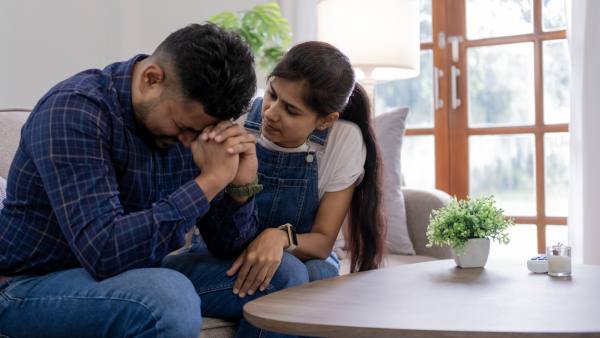At times I feel like I could have done a better job, but I just didn’t have the education…Rick [Rypien] was a good friend and I still miss him today.
Kevin bieksa
Grief is the anguish experienced after a significant loss, usually the death of a loved one. When that loss is a result of suicide—which ends the lives of around 4,500 people in Canada each year—the thoughts and feelings of grief can be particularly overwhelming.
Grief is a complex and deeply personal experience that often includes sadness, physical distress, longing, confusion, dwelling on the past and feeling apprehensive about the future.
Because grief is painful and death is hard to wrap our heads and hearts around, some people have found comfort in the idea that people pass through the “Five Stages of Grief”—denial, anger, bargaining, depression and acceptance. While these emotions can all be felt while grieving, scientific research has shown that the grieving journey rarely follows a predictable and orderly path. People experience grief differently, in their own way and in their own time.
Content warning: The following content discusses death by suicide.
Here’s what we DO know about grief and coping after a loss:
Emotional reactions to grief
How grief is experienced is as varied in duration and intensity as the range of emotions it produces: from sorrow to anger to loneliness to guilt. These emotions can surface unpredictably or be triggered by memories, events like birthdays and anniversaries, or even daily activities.
Suicide tends to intensify the emotional turmoil, with guilt often leading the way. If you find that you’re stuck in one or more negative emotions for weeks at a time, or that your grief is preventing you from looking after yourself and others who depend on you, it could be a sign you need some help.
It’s also common for people to experience a numbing of their emotions in response to a traumatic loss. Everyone grieves differently; there is no “right” or “wrong” way to feel.
Physical symptoms of grief
Grief can take a toll on your body in the form of fatigue, disrupted sleep patterns, loss of appetite, and agitation. The stress associated with grief can manifest in physical symptoms such as headaches, muscle tension, and digestive issues.
It may also lead to an overwhelming sense of numbness or the feeling of being in a fog as your mind and body grapple with the reality of the loss.
Healthy ways to cope with grief

Although no easy path through grief exists, there are steps you can take to make the grieving process more bearable and to help you heal:
Express yourself
Allow yourself to feel, experience and express a range of emotions. From talking to a trusted friend to writing in a journal, finding healthy ways to work through your emotions can support the healing process by helping you to understand and accept your feelings. Recognize that emotional and physical reactions to grief can influence and amplify each other.
Be compassionate
Be compassionate toward yourself. Guilt and shame are common and particularly challenging emotions, especially if you’re grieving a person who died by suicide.
If you’re a conscientious, compassionate and caring person, it is natural to question what you could have done differently and to replay past interactions for missed signs or opportunities to intervene. Relentless “what ifs” and self-blame can contribute to deep-seated guilt or shame that endures long after the loss. Be kind to yourself as you try to make sense of your experience.
Seeking professional support provides a safe space to express and process feelings of guilt and shame, and to receive guidance and education about the complex causes of suicide, which are often rooted in mental health struggles, illness and larger societal problems.
Seek professional support
Therapists, counsellors, or support groups specializing in grief and trauma can provide safe spaces for you to express your feelings and navigate the overwhelming emotions tied to the loss of someone important in your life.
Connect with supportive communities
While some people prefer to grieve on their own, others benefit from connection. Grief can make you feel lonely and lead you to isolate from others. Connecting with people who have experienced a similar loss can provide a sense of understanding and solidarity. Support groups, both in-person and online, can offer a space for sharing coping strategies and mutual support.
Building connections with people who have experienced the unique challenges of suicide loss can encourage compassion and perspective.
Establish routines and self-care

Maintaining a routine can provide stability when your life feels out of control. Establishing a daily schedule that includes regular exercise, healthy eating, and rest contributes to physical and emotional well-being.
Self-care practices such as meditation, journaling and deep breathing can also be effective in managing grief-fulled stress.
Honour their memory
Creating meaningful rituals or unique tributes to honour the memory of the deceased can be a positive way to channel grief. Some people visit a resting place while others make a person’s favourite meal. Establishing a memorial, organizing an event to celebrate the person’s life, or participating in charitable activities that reflect their interests are other ideas. These actions can range from personal, quiet ways of honouring a person’s memory to public advocacy efforts to transform grief into a constructive force for positive change.
Move forward with life
There’s no “normal” amount of time it takes for grief to pass. For some people, there’s no definitive end to the grieving journey. Instead, the loss they experienced becomes part of who they are, with feelings of sorrow, anger, loneliness and guilt gradually evolving into acceptance of their loss, and gratitude for the fond memories they will always have.
At the same time, there is often a realization that whoever they are grieving for would want them to go on living happy, healthy and fulfilling lives. We can grow around grief.
If something else that helped you cope while grieving, please feel free to share it in the comments below.
Get The Right Tool For The Job
Free mental health resources for men. Manage stress, anxiety and depression with Mindfit Toolkit.






Let’s Talk!
Did you enjoy this article? Let us know in the comments.
0 Comments